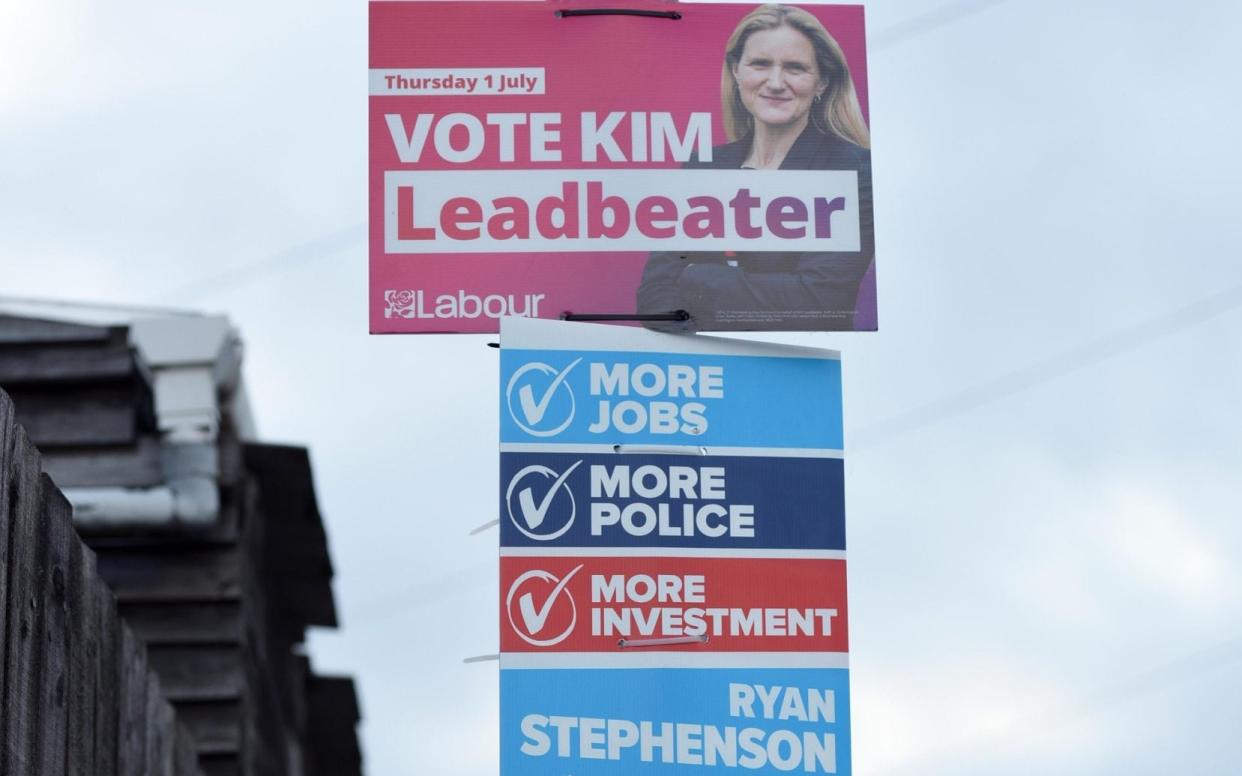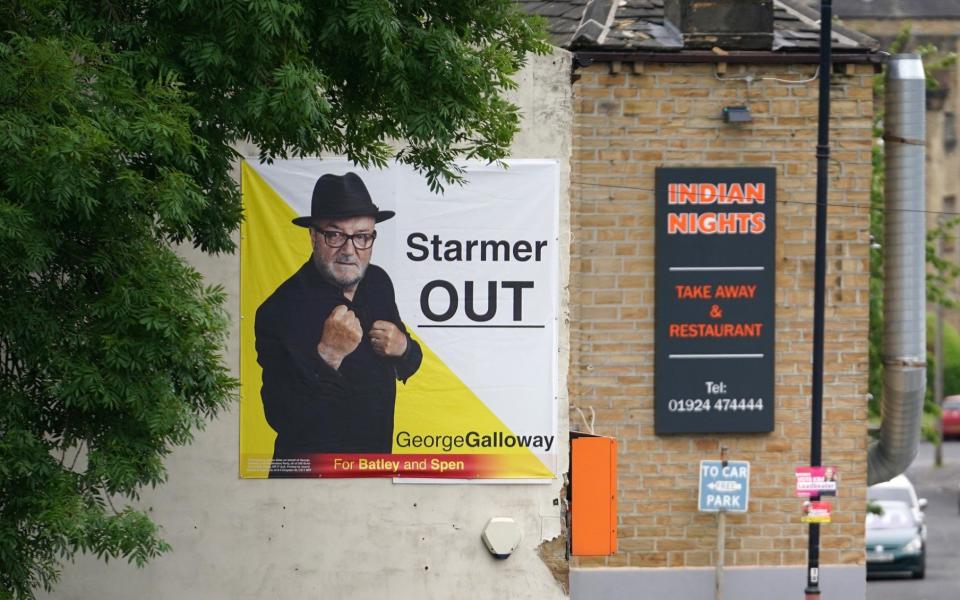How the Batley and Spen by-election could bring another crushing defeat for Labour

- Oops!Something went wrong.Please try again later.
The Batley and Spen by-election next week could be a third crushing electoral defeat for the Labour Party in as many months, after a bitter campaign in which Sir Keir Starmer has attempted to defend his slim majority from the Tories and a firebrand former Labour MP.
The by-election, on July, 1 was triggered in May when Tracey Brabin, the incumbent MP, gave up her seat to take a new job as mayor of West Yorkshire. Her mayoral role means she cannot continue as an MP, leaving Labour to defend the seat from a Tory attack.
Batley and Spen is a Yorkshire constituency south of Bradford and Leeds, comprising the former textile-manufacturing town of Batley and a collection of towns and villages across the Spen Valley. It is the bed manufacturing capital of the UK, but has a mixed economy with a variety of local businesses and industries.
The seat has been held by Labour since the 1997 election and before Ms Brabin was MP it was held by Jo Cox, who was murdered by a far-right extremist during the 2016 Brexit referendum campaign.
Kim Leadbeater, the Labour candidate this time, is Ms Cox's sister. The Tories have put up Ryan Stephenson, a councillor in Leeds.
Both major parties face a challenge from George Galloway, the former Labour MP who is campaigning with the explicit aim of forcing Sir Keir out and encouraging root-and-branch reform of the Labour Party.

Ms Brabin had a slim majority of 3,525 votes, and despite the seat's history of support for Labour, the latest polling puts the Tories ahead with 47 per cent of the vote, compared with Labour's 41 per cent and Mr Galloway's six per cent.
The suggestion that Labour could lose another heartland seat to the Tories has already led to the suggestion that Sir Keir should resign if he loses next week.
Rebel backbenchers on the left of Labour, including Diane Abbott, say the party has lost its way and point to the sackings of several senior party officials in the last few days as evidence that the leadership is in freefall.
Meanwhile, the excitement surrounding the by-election has raised hopes in Tory HQ that the party could pull another seat from Labour. That would make up for the loss of Chesham and Amersham last week, when Mr Johnson saw one of his former strongholds fall to the Liberal Democrats.
Labour’s trials and tribulations
The vote in Batley comes after a period of concern from Labour insiders about the direction of the party.
In May, Labour lost the constituency of Hartlepool, in north-east England. It had never voted for another party, but doorstep campaigners encountered disaffected locals who thought Sir Keir and his party had forgotten about the North and its priorities – especially over Europe.
Although the Chesham and Amersham by-election was a torrid result for the Tories, Sir Keir had an arguably worse night as Labour lost their deposit and secured just 1.6 per cent of the vote.
Those losses are significant because opposition parties tend to perform well in by-elections as voters often become disenchanted with ruling parties during their terms and use the elections as a protest against the Government.
But whether the results in Hartlepool and Chesham were due to a "vaccine bounce" in favour of Boris Johnson or a feeling of apathy towards Sir Keir, they show the party has been unable to capitalise on a series of votes that could have reversed a narrative of decline about the Labour leadership.
Inevitably, losses for the party in heartland seats ignites talk of the "Red Wall" – a swathe of former Labour constituencies in the north of England that fell to the Conservatives in 2019.
Batley and Spen, which did not rely heavily on industrial production in the 20th century and has pockets of wealthy villages and towns, is not the same type of seat as Workington, Bishop Auckland and the other "Red Wall" seats – but the polling success of the Tories there suggests Mr Johnson is making inroads into other Labour-voting demographics.
The Batley and Spen voters
In Batley, there are three groups of voters of concern for Sir Keir.
The first are Tory voters, generally concentrated in the more rural towns in the Spen Valley, away from Batley. There are electors there who have always voted Conservative, and who until 1997 had a majority in the constituency.
For those voters, the Brexit and pandemic successes of Mr Johnson have emboldened their resolve to see Batley and Spen turn blue for the first time in a quarter of a century.
Second are the former Labour voters who feel abandoned by the leaderships of Jeremy Corbyn and Sir Keir, who talk of a time when Labour was a "workers' party". Many point to Mr Corbyn's equivocation over Brexit as evidence that the party has left them behind. Batley and Spen voted to leave the EU in 2016 by 60 per cent to 40 per cent.
The third group are Muslim voters, who make up a sizeable portion of electors in the constituency. Many feel that, following a row over the use of a cartoon of the Prophet Mohammed in a classroom at Batley Grammar School earlier this year, Labour has lost sight of the priorities of Muslim voters and that the party's leadership no longer appreciates their votes.
Mr Galloway's campaign has focused on Sir Keir's diplomatic position on the Israel-Palestine conflict. Voters feel he should have supported the Palestinians over the recent violence in the region.
The issues
Locally, voters are concerned about investment in the town's high street and transport links, and call for Westminster to listen more to their concerns about economic decline.
Dewsbury, the neighbouring constituency that elected a Tory MP in 2019, has just been handed more than £25 million of development funding, and locals worry that, without a Conservative MP with close ties to the Prime Minister, they could lose out on similar investment in Batley.
Mr Stephenson has said he will be "banging the drum for investment" in the seat if elected.

Locals worried about crime in the area point to the closure of Batley Police Station, shuttered in 2018 and in the process of being converted into flats. If he wins on July 1, Mr Galloway says his first task will be to reverse the closure and put more police on the streets.
For the large Indian and Pakistani Muslim communities in the area, there are other issues beyond the constituency borders that could decide the election. Many who spoke to The Telegraph say the defining issue of the election is not potholes or local crime, but whether voters can take a principled stance against international injustice in Palestine and Kashmir.
Ms Leadbeater's campaign leaflets say she will be a strong voice for Palestinians in the Labour Party, but she cannot commit to changing the party's position on the issue.
Sir Keir has condemned human rights abuses in Gaza and the West Bank, but says Israel has the right to defend itself against rocket attacks from Hamas. That may not be enough to convince some Muslims that on issues of faith and conscience the Labour leader is on their side.
The campaign is not over yet
It is tempting to be too trusting in opinion polls, which suggest Labour is going to lose Batley and Spen.
If that happens, calls for the resignation of Sir Keir will only intensify and his critics' argument that Labour's reform has been too slow since the Corbyn era will become more compelling.
But the campaign is not over yet. If the Chesham and Amersham result last week teaches us anything, it is that by-election results are unpredictable and often fought on local issues that do not easily translate into arguments that take place in Westminster.
For now, campaigners on the ground will be fighting for every vote. If Labour cannot hold on to voters in Batley, the results could be very messy indeed.

